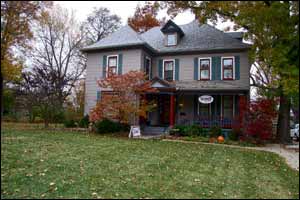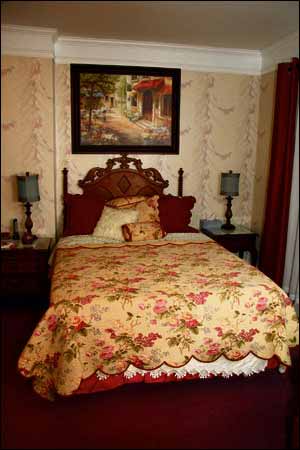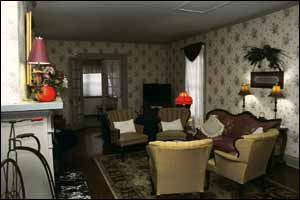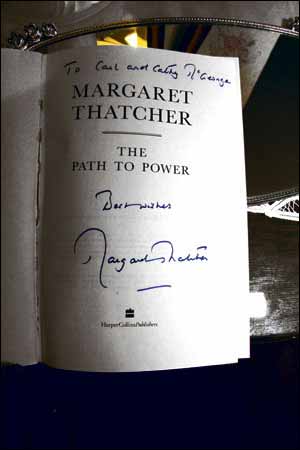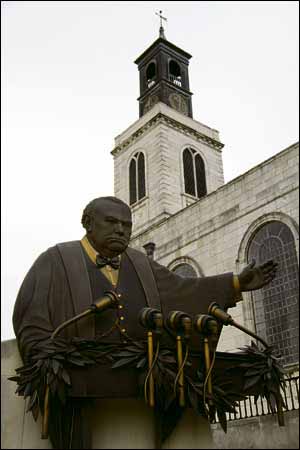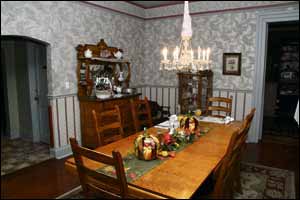 | ||||||
| The night I nearly slept in Lady T’s bed | ||||||
I could have slept in Margaret Thatcher’s bed. Some might consider I had a lucky escape (although she famously wasn’t for turning) when I ended up in husband Denis’s bed instead.
Before anyone judges me morally or politically, it did happen last month, more than four years after her death and 14 after Denis’s demise. Checking in to the Loganberry Inn, in Fulton, Missouri, owner Carl McGeorge could scarcely wait to appraise this British guest of the two nights the former Prime Minister came to stay with her entourage. It was March 8, 1996, and the Iron Lady had been out of office for six years when she pitched up in Fulton to deliver an address to mark the 50th anniversary of Sir Winston Churchill’s iconic Iron Curtain speech at Westminster College, 200 yards down the road from the inn. For Carl and his wife, Cathy, it was a shock. They had taken over the Loganberry only two days earlier, having never previously worked in the hospitality industry. ‘he Thatchers were their first guests. On the first morning, the McGeorges had risen early, fearing that the pipes might freeze. They needn't have worried though. They weren’t aware of Lady T’s famed ability to sleep little.
She told her worried hosts: “I don’t need much sleep, but ‘DT’ might have had a bit of a problem.” Carl knocked on Denis’s door to ascertain what the problem was. He found the room was freezing cold. Denis had apparently got up during the night to alter the heating, but had turned the thermostat to zero in error. He had used the shower wrongly. Carl recalled: “How do you tell someone like him that he was using it wrongly? “So I told Lady Thatcher who said she would tell ‘DT’ (as she always referred to him).” She enjoyed a full breakfast at the Loganberry, including home-made Bakewell tart, although she had requested orange marmalade for her second morning, which Carl had to track down, after much effort in Jefferson City, 24 miles away. Carl seemed equally thrilled that the Thatchers’ accompanying Scotland Yard officers had also joined them for breakfast and their promotional literature boasts of them as well as the former PM as previous guests. An unexpected guest was a young woman from Utah whose hairdressing skills had so impressed Lady T that she flew her to Fulton. “This young lady had probably never been out of Utah or on a plane before.” said Carl, “and suddenly she’s in a motorcade.” Lady T and Denis also sat down to a three-course dinner, prepared by Cathy . . . in their lounge, because they loved the blazing log fire there.
The McGeorges spent Sunday morning chatting with their famous guests over the breakfast table — at Lady T’s request. “She was very relaxed and despite what people say, she had a sense of humour. “We talked about the events of the weekend and about the facts we both have twins. “She also talked quite a bit about Ronald Reagan and how they were kindred souls. “It was one of those moments when we had to pinch ourselves. “Was it really happening? I’m sitting here like I had the neighbours and we’re talking to the former Prime Minister of Britain. There’s a signed copy of Thatcher’s memoirs in the bedroom that’s now named after her. Former Polish president Lech Walesa and Lady Mary Soames have since lodged at Loganberry Inn, but for the McGeorges nothing will ever beat the three days the Iron Lady came to stay. A three-minute walk from the inn is the residential Westminster College, described as having a curriculum based on the liberal arts. Founded in 1851 as Fulton College, it houses the National Churchill Museum (formerly the Winston Churchill Memorial and Library).
The church was first mentioned in 1181, destroyed in the Great Fire of London in 1666 and reconstructed in Portland stone by Wren. It was again gutted during the Blitz in 1940, leaving just a ruin. Two Churchill statues stand proudly at the college recalling the famous speech which would probably never have been delivered had American President Harry S Truman not handwritten a note at the end of the letter of invitation. Churchill, despondent after losing the election following the war, had been declining invitations to speak, but knowing that Truman would be alongside him, realised that this was an opportunity to be propelled back on to the world stage. More than 25,000 people lined the streets of Fulton to see Truman and Churchill. The speech, which predicted an imminent Cold War, received mixed reviews. Even Truman distanced himself at first from the sentiments expressed by Churchill, who gave his recipe to fight it and Soviet aggression. Churchill recalled that no-one would listen when he warned about Nazism. He hoped that wouldn’t happen again. Effectively, the Cold War began with Churchill’s speech which rejuvenated the former Prime Minister.
The museum is packed with memorabilia of the wartime leader and effectively relates his life story in depth. Visitors can see a carbon copy of an original draft of the Iron Curtain speech complete with a secretary’s shorthand annotations. There are gems of Churchill’s oratory, including his remark after the war: “My mother was American and my ancestors were officers in Washington's army. I am myself an English-speaking union.” And there’s reference to his first visit to the States in 1895, aged 21, en route to Cuba, where he was introduced to the fine cigars that became his trademark. More esoteric exhibits include one of those cigars and the huge key to Blenheim Palace. Tim Riley, chief curator and director of the museum, said: “What we try to do here is make history come alive.”
Mikhail Gorbachev famously spoke there in 1992, declaring the end of the Cold War, and Henry Ford, former presidents George H Bush and Ronald Reagan, Lech Walesa and Bob Geldof have also stood at the same lectern. In Fulton, don’t miss the Brick District, packed with interesting shops and restaurants. Its historic streets, with their attractive gas lamps, are paved with used bricks Bek’s American Restaurant, in an old garage-cum-warehouse and the Playhouse Bistro seem to be the pick of the eating places.
|
